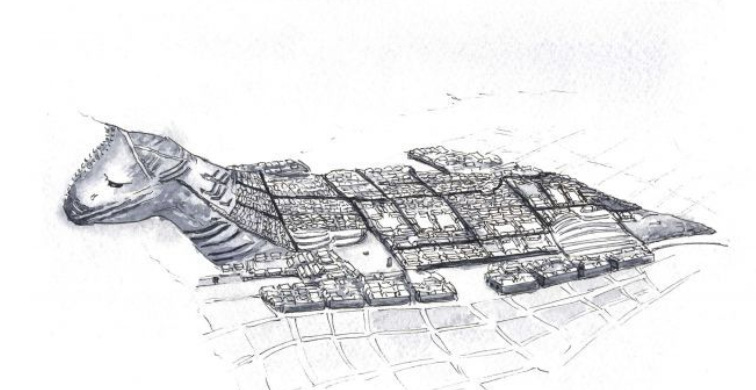“To improve is to change; to be perfect is to change often.” -Winston Churchill
We live in rural Texas. The kind of rural that means you spend a lot of time driving to larger towns to buy groceries, save twenty cents on a gallon of gas, and have any prayer of finding a restaurant open during the first half of the week.
Our nearest source for the essential Texas grocery phenomenon that is H-E-B is a town called Bastrop, pronounced BASS (like the fish) - trawp. Unless you’re pronouncing the word that means you’re from BASStrawp, a Bastropian. Then that second syllable morphs into a long ‘o’, as in ‘rope’.
Bastrop is unique in that it is certainly the opposite of the ubiquitous Springfield of Simpsons fame, with at least one town of the same name in virtually every state. According to my diligent 30 seconds of Google research, there is exactly one other Bastrop in the USA. It’s in Louisiana, and they are both named for the same guy.
Here’s where things get interesting and not a little ironic: the man for whom these towns are named, the Baron de Bastrop? That wasn’t his real name.
When I first had the idea to write about this intriguing little factoid, I figured my research would lead me to yet another sad tale of a loser, a con artist, a grifter; putting on airs and ripping folks off until they wised up and ran him out of town.
But the Baron’s career path seems more like some kind of topsy-turvy Witness Protection, where the more outlandish your new persona is, the less likely your former identity will be discovered.
The Baron de Bastrop was born Philip Hendrik Nering Bögel in Dutch Guyana in 1759. I’ll let you Google to find out exactly where that is. Hint: South America.
His family returned to Holland when he was still in short pants. He grew up there in what sounds like a fairly traditional middle class life. Joined the military, married, had a bunch of kids. He landed a solid gig as a tax collector. Things were going swimmingly. Until he did a Bernie Madoff, and got caught with his hand in the cookie jar.
With a warrant and hefty reward out for his arrest, Bögel pulled the old switcheroo and became Bastrop. Who knows why he chose this name. I guess so he could keep all his monogrammed hankies? Anyway, he and the fam hightailed it out of the country and returned to the New World; this time, to North America.
By the time they landed in Philadelphia, he was workin’ that new persona. The erstwhile crook was now passing himself off as Dutch nobility. He cooked up some sad story about having to flee his homeland when the French invaded. Two hundred years before search engines were invented, who was able to call him on it?
It appears he dragged the wife and kiddos from pillar to post for a few years, trying to find a new hustle. It wasn’t long before the wife had her fill of the nomad life and packed up the kids and returned to Holland. But the Baron stayed here. He dabbled in managing colonization efforts of the Spanish government, which is what led to the first town being named for him. That’s the one in northeast Louisiana.
He must’ve had a talent for the colonizing biz, or thought it had potential, because with just a few intermissions, he stuck with it for the rest of his days. When Thomas Jefferson & Co. bought Louisiana, Bastrop moved to Spanish Texas to continue his fruitful working relationship with Spain.
It was during his initial foray into Texas that he took a break from colonizing and became a spy. By now, Bastrop was a businessman in San Antonio. During the Mexican War of Independence, he remained loyal to the Spanish and served as a double agent among the Mexican revolutionaries, reporting on their plans and whereabouts to his Spanish compadres. These counter-intelligence activities were instrumental in the capture and eventual execution of the leaders of the Mexican resistance.
So, just to be clear, what we have here is a Dutch immigrant with an assumed identity masquerading as a Mexican revolutionary while snitching on them to the Spanish. All those years faking it really paid off for our boy Bastrop. He must’ve been quite the actor. I mean, you’ve got Dutch Boy with the accent, learning English as well as Spanish, sporting around the wild and woolly Texas frontier. He definitely did not blend. It’s a miracle he wasn’t killed.
Time passed. Bastrop remained in San Antonio. According to one report, if he had made any money in his previous ventures, by the time this life-changing wildly serendipitous event occurred, he was barely scraping by. One day, minding his own business, he bumped into an old friend from his Spanish Louisiana colonization days.
Moses Austin had traveled hundreds of miles from Missouri to San Antonio to beg on bended knee for permission to found a colony in Spanish Texas. Things were not going well for him. The Spanish weren’t keen on the Americans. They showed him the door before he even had a chance to remove his hat.
And that’s when he bumped into the Baron. The Baron wasn’t rich, but he had connections, including one General Arredondo. That Arredondo was not a fan of the norteamericanos was putting it lightly. But he probably remembered the pivotal role the Baron played in tracking down the Mexican revolutionaries, the capture and execution of which brought much glory to Arredondo’s reputation. I guess you could say he owed the Baron one. The Baron turned into a dealmaker. The next thing you know, Moses Austin is leaving Texas with a bright shiny colonization certificate, off to recruit 300 colonists and bring them to Texas.
Moses Austin died before he could complete his colony plan, but his son Stephen F., of whom you may have heard, agreed to complete those plans per his father’s deathbed wish. He continued the relationship with his father’s friend the Baron, and appointed him as commissioner of colonization for the Austin colony.
The Baron later served in the state legislature, strongly supporting immigration and colonization as a buffer against the aggressive Native American tribes who were the original residents. I found it interesting that in those days legislators’ salaries were paid by their constituents. Not via a complex web of taxation, but by direct donations. Needless to say, he barely scraped by. When he passed away in 1827, his fellow legislators took up a collection to pay his burial expenses. He is buried in Saltillo, which was the capital of the state he represented (Coahuila y Tejas). He left his land holdings to his estranged wife and children.
You may have noticed I’ve chosen to refer to him as ‘the Baron’ a few times here. That’s because I have no idea what first name he preferred. Folks were just supposed to call him ‘Baron’, like ‘your highness’? Maybe Phil among friends? Hank, to his wife? The notorious B.D.B.?
Whatever the moniker, more than one of the sources for this story claimed folks were aware the Baron de Bastrop had ‘pretensions to nobility’, as one phrased it. They knew he was a sham. But apparently he was able to deliver for them, and that’s what counted. And that’s why I swerved away from casting him as a con man. I found no evidence that he continued his embezzling ways once he turned over a new leaf in North America. Fleeing the country under an assumed name and traveling halfway around the world to avoid prosecution must’ve made an impression. It appears he learned his lesson.
I will leave you with three things.
We watched this YouTube video about the ancient ruins of Peru in my Spanish class recently. Fun fact: Machu Picchu isn’t the only amazing archeological site down there. Funner fact: the ancient city of Cusco was designed in the shape of a cat.
Yes I heard all the cultural appropriation controversy; the dirt, if you will, about the book American Dirt by Jeanine Cummins. I took it at face value, got all judge-y, and chose not to read it. Big mistake. We read it recently for one of my book clubs and it is freakin’ phenomenal. Run, don’t walk, to your nearest library or book store and grab a copy.
Yellow Volkswagen* category: Neri/Bastrop wasn’t the only Dutch immigrant to Texas on my radar recently. I didn’t realize the Kokernot family, they of the massive ranches and fortunes and Alpine Cowboys fame, also originally hailed from the Netherlands.
*refers to that odd circumstance when something completely random (like Dutch immigrants to Texas, or a vintage yellow Volkswagen) appears on your radar, and then, suddenly, you see them all over the place.
My latest book, Double Fault, is available now on Amazon.
When an investigation of illegal match fixing by the Russian mob brings the FBI to her tennis club in the person of hunky agent Wilson DuBois, Veronica Burk vows to help him solve the case quickly before her own very successful gambling habit falls under suspicion.
Ventured is also available on Amazon.
When she takes a chance on making a new life for herself, French orphan and cutpurse extraordinaire Belle must find a way to survive in the New World—or she may not live long enough to enjoy it.
My YA trilogy is also still available if historical fiction isn’t your thing.
Brody Morgan grew up starring in commercials for his dad's mega food corporation. What will Brody do when he discovers what he's really been selling?









Naomi P. Lane I apologize for clicking on the wrong button and deleting your comment. My best effort here to replace it:
What an interesting story of origin. I didn’t know that American colonies were purchased for $300 by random immigrants seeking to bring their kinfolk over. This guy sounded like quite the con-artist and philanderer. You also taught me a new word today. I had never heard the term “cutpurse” before.